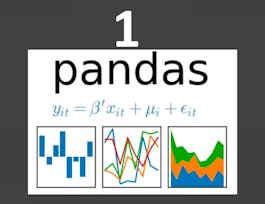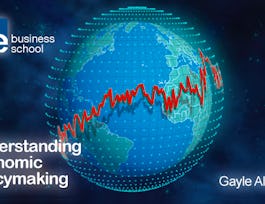Economic policy affects every citizen. And economic policymaking is best done as a collaborative process with a wide range of stakeholders. This course brings an understanding of the relevance and impacts of economic policymaking in everyday life, and the ways for citizens to be involved in shaping economic policy, in an accessible and interesting manner. Taught by Dr. Vijay Kelkar and Dr. Ajay Shah, along with Aromar Revi, Director, IIHS, the course synthesises more than one hundred years of their combined experience as professional economists and public intellectuals.



(96 reviews)
Recommended experience
What you'll learn
Identify the role of the government in defining and implementing policy
Recognise the various objective aspects of policymaking, and appreciate the various softer / people aspects involved
Analyse the steps involved in the process of policymaking, and discuss various nuances and challenges in defining and implementing it
Skills you'll gain
Details to know

Add to your LinkedIn profile
5 assignments
See how employees at top companies are mastering in-demand skills


Earn a career certificate
Add this credential to your LinkedIn profile, resume, or CV
Share it on social media and in your performance review

There are 6 modules in this course
Welcome to The Art and Science of Economic Policy (TASEP). The goal of this course is to help you understand the why, when, what, and how of economic policymaking. In this module, you will get an overview of what to expect from this course. You will also meet your instructors and have the opportunity to meet your fellow learners. We hope this module helps you familiarise yourself with the course and its contents so you are prepared to learn most effectively from the following set of modules.
What's included
2 videos3 readings2 discussion prompts1 plugin
This module introduces you to the foundational concepts surrounding governance. Together, we will reflect on questions such as why we need a government, and what its duties and responsibilities are. We will also look at examples from the past where governments have faltered, its reasons, and the possible solutions. Happy learning!
What's included
5 videos10 readings1 assignment3 discussion prompts
In this module, you will learn about objective concepts and principles relating to policymaking that can help us with decision making – behavioural economics, pricing, competition, and root cause analysis. These concepts are supported with strong relevant examples to aid your understanding.
What's included
9 videos11 readings1 assignment1 discussion prompt
In this module, you will switch gears and look at policymaking from the people or society perspective. The ideas and concepts discussed in this module are more subjective, such as understanding context, finding value in patience, appreciating nuances of complexity and conflict, and knowing the power of transparency.
What's included
9 videos9 readings1 assignment1 discussion prompt
This module introduces you to the different stages and processes of policymaking. You will also learn about the need for the state to prepare for policy implementation and the benefits of creating collaborative pathways between government and academic institutions. You will hear about many examples relating to these ideas, and you will find it particularly beneficial to participate in the discussion forums in this module.
What's included
5 videos7 readings2 assignments
We hope you found this course informative and useful for your current work or academic needs. Thank you very much for being part of the course. In the concluding video, we round up the ideas discussed in this course and each of the instructors share their parting notes on how you can translate concepts from this course into your own practice.
What's included
1 video1 plugin
Instructors



Offered by
Recommended if you're interested in Economics

Coursera Project Network

Google Cloud

Universidad Nacional Autónoma de México

IE Business School
Why people choose Coursera for their career




Learner reviews
Showing 3 of 96
96 reviews
- 5 stars
77.31%
- 4 stars
16.49%
- 3 stars
2.06%
- 2 stars
3.09%
- 1 star
1.03%

Open new doors with Coursera Plus
Unlimited access to 7,000+ world-class courses, hands-on projects, and job-ready certificate programs - all included in your subscription
Advance your career with an online degree
Earn a degree from world-class universities - 100% online
Join over 3,400 global companies that choose Coursera for Business
Upskill your employees to excel in the digital economy
Frequently asked questions
Access to lectures and assignments depends on your type of enrollment. If you take a course in audit mode, you will be able to see most course materials for free. To access graded assignments and to earn a Certificate, you will need to purchase the Certificate experience, during or after your audit. If you don't see the audit option:
The course may not offer an audit option. You can try a Free Trial instead, or apply for Financial Aid.
The course may offer 'Full Course, No Certificate' instead. This option lets you see all course materials, submit required assessments, and get a final grade. This also means that you will not be able to purchase a Certificate experience.
When you purchase a Certificate you get access to all course materials, including graded assignments. Upon completing the course, your electronic Certificate will be added to your Accomplishments page - from there, you can print your Certificate or add it to your LinkedIn profile. If you only want to read and view the course content, you can audit the course for free.
You will be eligible for a full refund until two weeks after your payment date, or (for courses that have just launched) until two weeks after the first session of the course begins, whichever is later. You cannot receive a refund once you’ve earned a Course Certificate, even if you complete the course within the two-week refund period. See our full refund policy.


